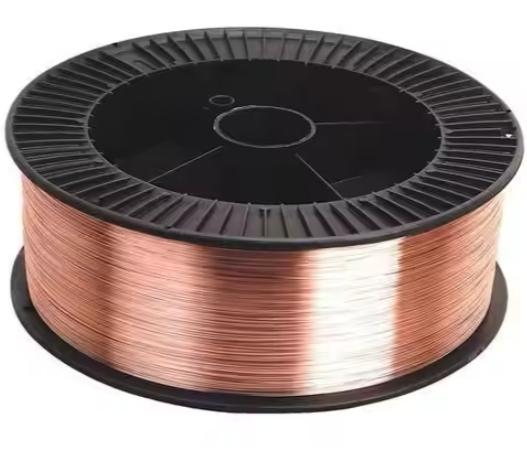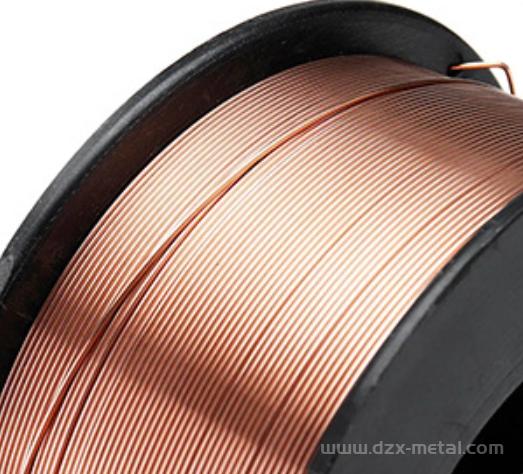Welcome to Jiangsu DZX Metal Co., Ltd.
Email:sales8@dlx-alloy.com Mobile/Whatsapp:+86 199 0611 9641
Professional manufacturer of welding wires and spraying wires,over 20 years.
Whatsapp:+8619906119641
Email:sales8@dlx-alloy.com
Add:NO.32 West Taihu Road, Xinbei District, Changzhou, Jiangsu,China
Copper Welding Wire
High-Strength CuNi5Fe1 MIG Filler Rod - AWS Compliant for Industrial Applications
Product Details
Our High-Strength CuNi5Fe1 MIG Filler Rod is built for industries that need tough, reliable welds in demanding conditions. This copper-nickel alloy, with roughly 5% nickel and 1% iron, is designed for MIG welding, offering a tensile strength of about 760 MPa and a yield strength of 345 MPa. It’s perfect for joining 90/10 copper-nickel alloys or overlaying steel, delivering welds that resist corrosion, erosion, and cavitation. Compliant with AWS A5.7 standards, this filler rod shines in applications like industrial piping, marine equipment, and chemical processing systems. Its smooth arc stability and low spatter make welding a breeze, saving time on cleanup and ensuring high-quality results every time.
Available in diameters like 0.035”, 0.045”, and 1/16”, our CuNi5Fe1 rod is versatile enough to handle a range of project sizes. The alloy’s excellent thermal conductivity and resistance to harsh environments, like seawater or acidic chemicals, make it a top choice for heavy-duty industrial use. Whether you’re working on a power plant’s cooling system or a ship’s hull, this filler rod delivers durability and performance you can count on.
For more other size details, pls directly contact us
The copper-nickel alloy market is on a steady upward trajectory, fueled by the need for durable materials in industries like marine, power generation, and chemical processing. Global infrastructure projects, especially in coastal and industrial regions, are driving demand for high-strength, corrosion-resistant welding materials like our CuNi5Fe1 MIG filler rod. The industrial sector is seeing a surge in applications for copper-nickel alloys, particularly in energy and water treatment systems, where materials must withstand aggressive environments without degrading. Market trends indicate a growing focus on sustainable materials, with copper’s recyclability making it a favorite for eco-conscious industries.
Shipbuilding remains a key growth area, as naval and commercial vessels require welds that can endure constant seawater exposure. The rise of desalination plants to combat water scarcity is another major driver, with CuNi5Fe1 being a go-to material for constructing reliable piping systems. In the chemical industry, the need for equipment that resists acidic and chloride-rich environments is pushing demand for high-performance alloys. Emerging technologies, like additive manufacturing with copper-nickel powders, are starting to gain traction, but traditional MIG welding remains the backbone of heavy industrial applications. As industries prioritize efficiency and longevity, our CuNi5Fe1 filler rod is well-positioned to meet these evolving needs.
Applications
Our CuNi5Fe1 MIG filler rod is a powerhouse in industrial applications. In marine settings, it’s used to weld 90/10 copper-nickel alloys for ship components like hulls, piping, and propeller shafts. Its resistance to seawater corrosion and biofouling makes it a top pick for seawater cooling systems in ships and coastal power plants. Desalination facilities rely on this rod for constructing durable heat exchangers and pipelines that handle salty, corrosive conditions without breaking down over time.
In the petrochemical sector, our filler rod is essential for fabricating equipment like reactors, pipelines, and storage tanks that face harsh chemical environments. Its high tensile strength and resistance to stress corrosion cracking ensure welds that last, reducing maintenance costs and downtime. Power generation systems, including HVAC and refrigeration units, benefit from CuNi5Fe1’s excellent thermal conductivity, making it ideal for heat exchanger fabrication. The rod also performs well in welding dissimilar metals, such as copper-nickel to steel or nickel alloys, delivering strong, defect-free joints for complex industrial projects.
|
AWS Classification |
Applications |
|
ERNiCr-3 |
Used for welding 600, 601, and 800 alloys and dissimilar welding between stainless steel and carbon steel |
|
ERNiCrFe-7 |
Suitable for welding nickel-chromium-iron alloys under ASTM B163, B166, B167, and B168 standards |
|
ERNiCrFe-6 |
Designed for welding steel to nickel-chromium-iron alloys, as well as stainless steel to nickel-based alloys |
|
ERNiCrCoMo-1 |
Used for welding nickel-chromium-cobalt-molybdenum alloys and various high-temperature alloys |
|
ERNiCrMo-3 |
Suitable for nickel alloy, carbon steel, stainless steel, and low alloy steel welding, primarily used for 625, 601, 802 alloys, and 9% nickel alloys |
|
ERNi-CI |
Used for welding commercially pure nickel, malleable cast iron, and gray cast iron |
|
ERCuNi |
Suitable for welding 70/30, 80/20, and 90/10 copper-nickel alloys |
|
ERNiCu-7 |
Used for welding nickel-copper alloys such as B127, B163, B164, and B165 |
|
ERNi-1 |
Designed for welding pure nickel castings and forgings, including those under ASTM B160, B161, B162, and B163 standards |
|
ERNiFeMn-CI |
Suitable for welding nodular cast iron, ductile iron, malleable cast iron, and gray cast iron, as well as their dissimilar welding to stainless steel, carbon steel, low alloy steel, and various nickel alloys |
|
ERNiCrMo-4 |
Used for welding nickel-chromium-molybdenum alloys, or for welding nickel-chromium-molybdenum alloys to steel and other nickel-based alloys |
|
ERNiCrMo-11 |
uitable for self-welding nickel-chromium-molybdenum alloys, dissimilar welding with steel and other nickel alloys, and also for cladding applications |
|
ERNiCrMo-13 |
Used for welding low-carbon nickel-chromium-molybdenum alloys |
|
ENiCrMo-3 |
Designed for welding nickel-chromium-molybdenum alloys, including 625, 800, 801, 825, and 600 |
|
ENiCrFe-3 |
Used for welding nickel-chromium-iron alloys and for dissimilar welding with carbon steel |
|
ENiCrFe-2 |
Suitable for welding austenitic steel, ferritic steel, and high-nickel alloys, also used for 9% nickel alloy welding |
|
ENiCu-7 |
Primarily used for welding nickel-copper alloys and their dissimilar welding with steel |
|
ENiCrFe-7 |
Ideal for welding 690 (UNS N06690) nickel-chromium-iron alloys |
|
ENiCrMo-4 |
Designed for C-276 alloy welding and most nickel-based alloys |
|
ENiCrCoMo-1 |
Suitable for welding nickel-chromium-cobalt-molybdenum alloys and various high-temperature alloys |
|
ERCuNi |
Used for welding forged or cast 70/30, 80/20, and 90/10 copper-nickel alloys |
|
ENiCrMo-13 |
Used for welding low-carbon nickel-chromium-molybdenum alloys |
|
ENiCrMo-11 |
Used for welding low-carbon nickel-chromium-molybdenum alloys |
Physical & Mechanical Properties
|
Welding Wire Type |
Density (g/cm³) |
Melting Point (°C) |
Electrical Conductivity (% IACS) |
Coefficient of Thermal Expansion (10⁻⁶/°C) |
Tensile Strength (MPa) |
Yield Strength (MPa) |
Elongation at Break (%) |
|
Carbon Steel Welding Wire |
7.85 |
1450 |
8-10 |
11.8 |
400-550 |
300-400 |
20-25 |
|
Stainless Steel Welding Wire |
7.9 |
1350-1450 |
2-5 |
16-17 |
550-650 |
300-400 |
30-40 |
|
Aluminum Welding Wire |
2.7 |
600-660 |
>60 |
23.1 |
150-200 |
75-100 |
>20 |
|
Nickel Alloy Welding Wire |
8.4 |
1350-1400 |
1-2 |
13.1 |
600-800 |
400-600 |
30-40 |
|
Welding Rod Type |
Coating |
Electrical Resistivity (10⁻⁶ Ω·cm) |
Hardness (HV) |
Heat Resistance (°C) |
Tensile Strength (MPa) |
Yield Strength (MPa) |
Elongation at Break (%) |
|
Carbon Steel Welding Rod |
Acid coated, alkaline coated |
10-15 |
150-200 |
< 450 |
400-550 |
300-400 |
20-25 |
|
Stainless Steel Welding Rod |
Acid coated, alkaline coated |
60-80 |
200-400 |
< 800 |
550-750 |
350-450 |
25-35 |
|
Cast Iron Welding Rod |
Alkaline coated |
90-120 |
250-450 |
300-600 |
300-500 |
150-300 |
10-20 |
|
Nickel Alloy Welding Rod |
Alkaline coated |
80-100 |
200-300 |
< 1200 |
700-900 |
450-650 |
20-35 |
For more other size details, pls directly contact us
We’ve been in the game for over a decade, and our CuNi5Fe1 MIG filler rod reflects our commitment to quality and innovation. Every rod is manufactured with precision, meeting AWS A5.7 standards and undergoing rigorous testing in our advanced labs to ensure consistent performance. Our filler rod offers superior arc stability and minimal spatter, which means cleaner welds and less time spent on rework. We know industrial projects demand reliability, and our product delivers welds that hold up under mechanical stress and corrosive conditions.
What sets us apart is our flexibility. We offer a range of diameters and full OEM/ODM support, so you get a product tailored to your specific needs. Our technical team is always ready to provide expert advice, helping you choose the right rod for your project. Sustainability is a big focus for us—we use recyclable materials and eco-friendly production methods to align with modern industry standards. With a robust global supply chain, we ensure fast, reliable delivery, whether you’re working on a local job or an international project. Our dedication to quality, customization, and customer support makes us the top choice for copper-nickel welding solutions.
Comparison Parameters Table
|
Parameter |
CuNi5Fe1 |
Standard ERCuNi |
|---|---|---|
|
Composition |
Cu (Balance), 5% Ni, 1% Fe, 0.2-0.5% Ti |
Cu (Balance), 29-32% Ni, 0.4-0.75% Fe |
|
Tensile Strength |
760 MPa |
540 MPa |
|
Yield Strength |
345 MPa |
215 MPa |
|
Corrosion Resistance |
Excellent (Seawater, Acidic Environments) |
High (Seawater, General Corrosion) |
|
Thermal Conductivity |
High, ideal for heat exchangers |
Moderate, less efficient in heat transfer |
|
Welding Processes |
MIG, TIG, Oxy-Fuel |
MIG, TIG, Oxy-Fuel |
|
Applications |
Industrial piping, marine, petrochemical |
Marine, general industrial |
|
Diameter Options |
0.035”, 0.045”, 1/16” |
0.035”, 0.045”, 1/16” |
|
Customizability |
Full OEM/ODM support |
Limited customization |
Our CuNi5Fe1 MIG filler rod is a cut above the rest, offering high strength, corrosion resistance, and versatility for industrial applications. Its ability to withstand seawater, acidic environments, and high temperatures makes it a must-have for projects where durability is non-negotiable. Whether you’re welding pipelines, heat exchangers, or marine components, this rod delivers reliable, high-quality welds with minimal hassle. Our focus on precision manufacturing and customizable options ensures you get exactly what you need, backed by a company with years of expertise.
The industrial landscape is evolving, with growing demand for materials that can handle tough conditions while supporting sustainable practices. Our CuNi5Fe1 filler rod meets these demands, offering exceptional performance in marine, petrochemical, and power generation applications. With global infrastructure projects on the rise, this rod is your go-to solution for welds that last. Trust us to provide the materials and support you need to keep your projects running smoothly and efficiently.
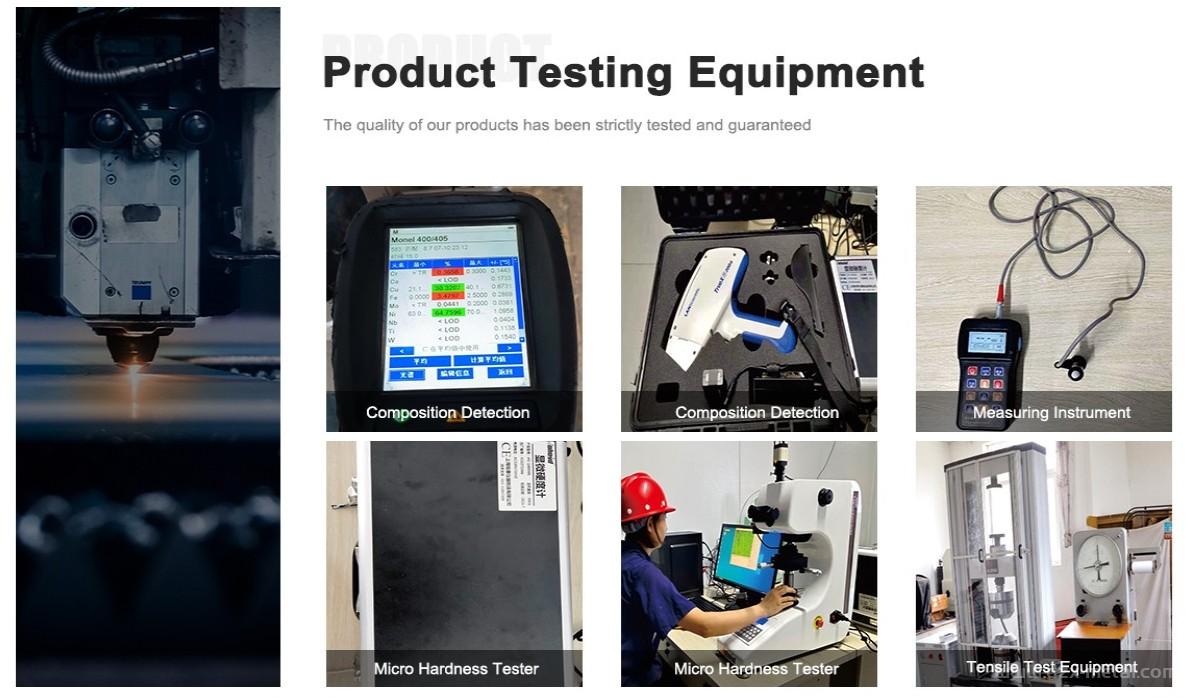
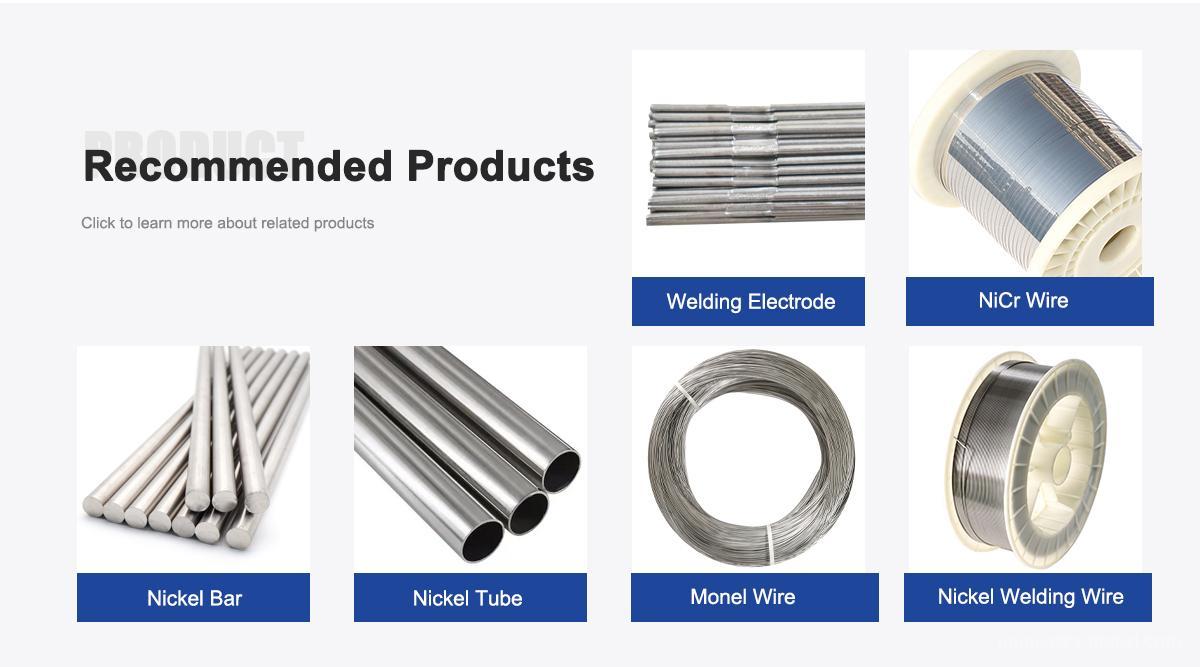
About Us:
Our 12,000㎡ factory is equipped with complete capabilities for research, production, testing, and packaging. We strictly adhere to ISO 9001 standards in our production processes, with an annual output of 1,200 tons. This ensures that we meet both quantity and quality demands. Furthermore, all products undergo rigorous simulated environment testing including high temperature, high pressure, and corrosion tests before being dispatched, ensuring they meet customer specifications. We also provide chemical analysis reports for every FeCrAl alloy, NiCr alloy, and other products purchased.
For all our clients, we offer timely and multilingual after-sales support and technical consulting, helping you resolve any issues swiftly and efficiently.
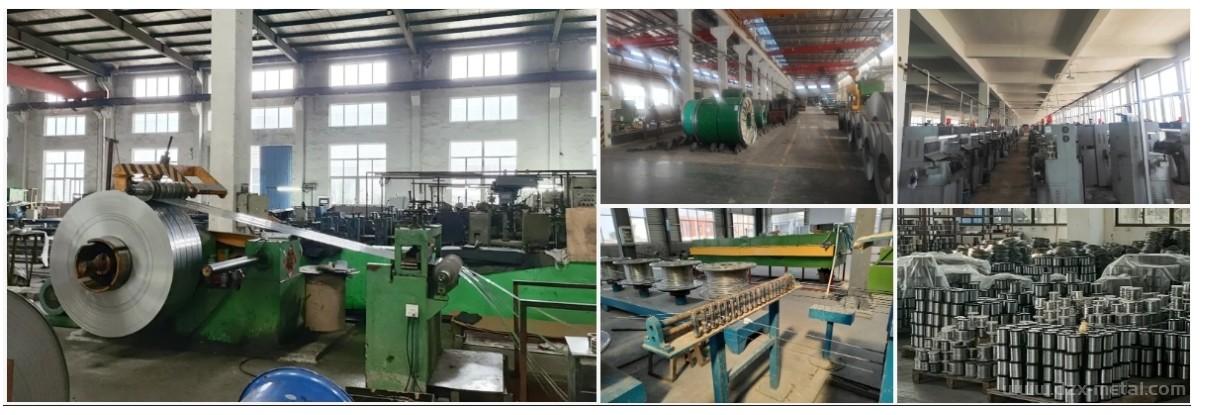
Client Visits
Building Stronger Partnerships
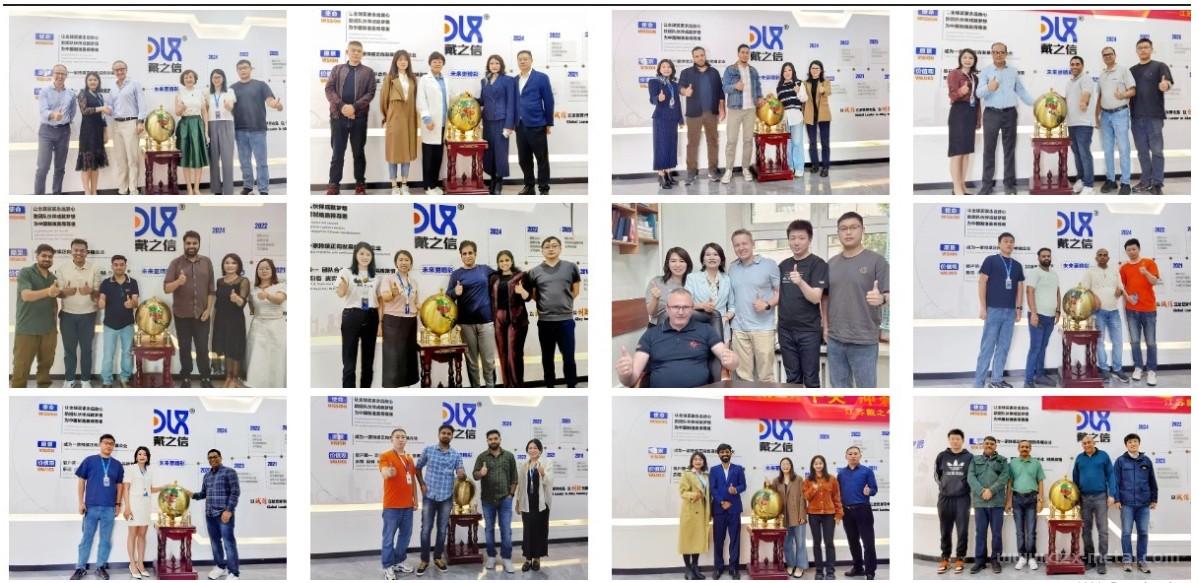
We support all kinds of testing:
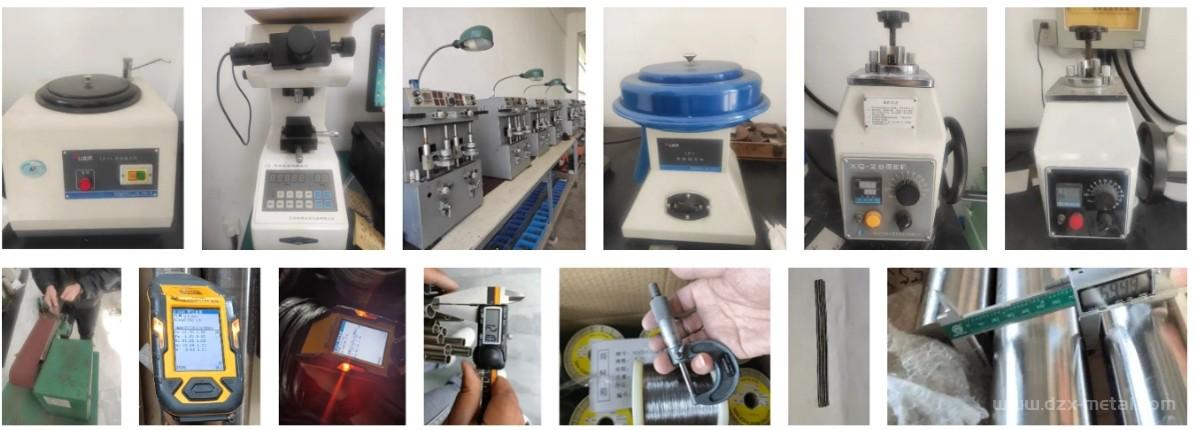

FAQs:
-
What is CuNi5Fe1 MIG filler rod used for?
It’s used for welding 90/10 copper-nickel alloys in industrial applications like piping, heat exchangers, and marine equipment due to its high strength and corrosion resistance. -
What are the main properties of CuNi5Fe1?
It boasts a tensile strength of 760 MPa, yield strength of 345 MPa, excellent corrosion resistance, and high thermal conductivity for industrial environments. -
Can CuNi5Fe1 be used for welding dissimilar metals?
Yes, it’s great for joining copper-nickel alloys to steel or nickel alloys, with a nickel alloy 610 barrier layer recommended for steel overlay in MIG welding. -
What welding process is CuNi5Fe1 designed for?
It’s optimized for MIG welding but can also be used in TIG and oxy-fuel processes with proper setup. -
What diameter options are available for CuNi5Fe1 filler rods?
Standard sizes include 0.035”, 0.045”, and 1/16”, with custom diameters available for specific project needs. -
Is CuNi5Fe1 suitable for corrosive environments?
Absolutely, it’s highly resistant to seawater, chloride, and acidic corrosion, making it ideal for industrial and marine settings. -
How does CuNi5Fe1 perform in high-stress applications?
Its high tensile and yield strength ensure reliable welds that withstand mechanical stress and harsh conditions. -
Can CuNi5Fe1 be customized for specific projects?
Yes, we offer OEM and ODM services to tailor the rod’s specifications to your project requirements.

